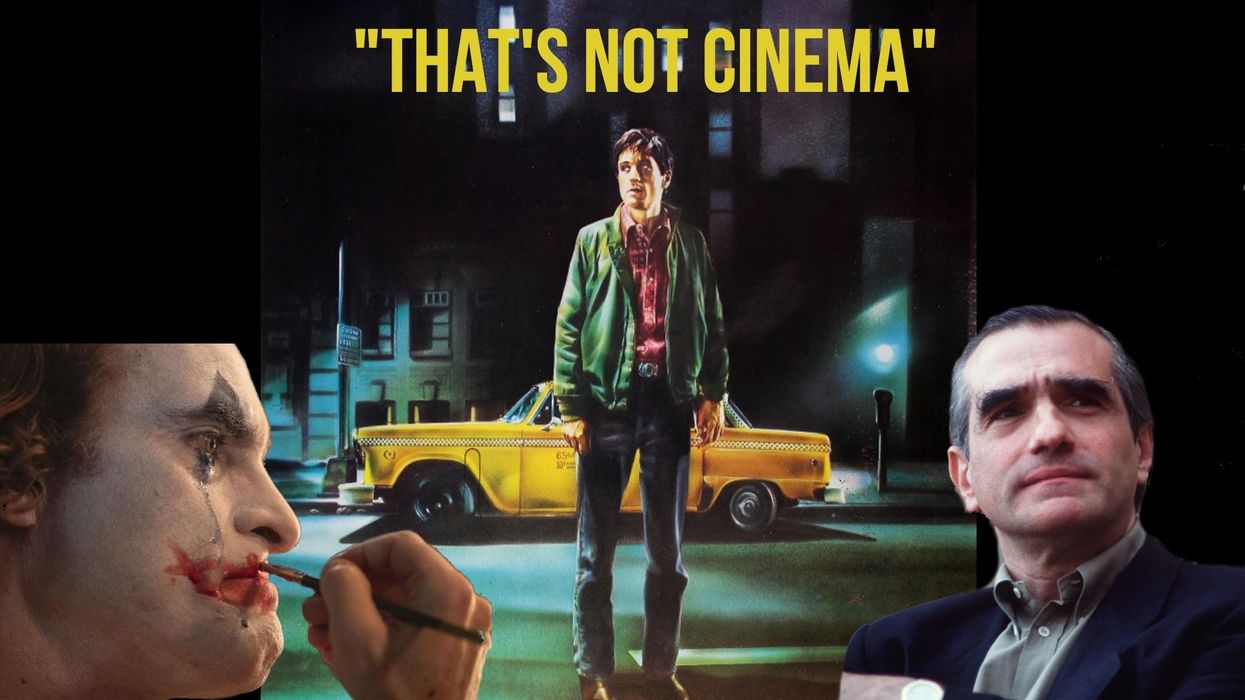Scorsese Says Marvel Movies Are 'Not Cinema' As 'Joker,' Based on His Work, Opens Wide
The timing of The Irishman director's comment is fascinating.

Martin Scorsese is one of the most prolific and critically-acclaimed living filmmakers. He has a big new movie, Netflix's The Irishman, coming out this fall. But beyond that, he's a filmmaker's filmmaker. A lover of the craft, a fan of the greats, a man who has devoted a ton of his time and energy to film preservation. He also champions the classics and makes sure they are available to future generations for study and enjoyment.
According to Comicbook.com, in an interview with Empire, Scorsese was asked about the Marvel Cinematic Universe that has taken the box office by storm in recent years and he had this to say:
“I don’t see them. I tried, you know? But that’s not cinema... Honestly, the closest I can think of them, as well made as they are, with actors doing the best they can under the circumstances, is theme parks. It isn’t the cinema of human beings trying to convey emotional, psychological experiences to another human being.”
So, based on this, what does qualify as "cinema" and what is Martin Scorsese really trying to say here?
There has long been a battle between the idea of movies being about real "substance" or human drama -- movies that strive to be art and movies that are made largely for commercial reasons. Recent changes to the entertainment industry at large have really highlighted the value of IP, intellectual property. The shift has been a long, slow one, taking place over the better part of a generation -- and starting arguably in the mid-late 1970s with the release of Jaws in 1975 and Star Wars in 1977.
Scorsese, in a sense, has been on one side of this battle almost since the moment he got in the game. The Oscar-winning filmmaker does have the benefit of a long and acclaimed track record, so he can still find the money for an epic period piece like The Irishman (though it wasn't the easiest path). Younger filmmakers today would be hard-pressed to find much mainstream financial backing for a period movie, based on a book, starring actors in their late 70s, the way Scorsese has. The clout he and his cast have (Robert De Niro, Al Pacino, and Joe Pesci) make such a spend possible, even for a streaming title with a limited theatrical release.
If one is to break in as a writer-director in the current landscape, that person's next project will likely be a large franchise picture.
Some filmmakers thrive with this assignment -- look at Ryan Coogler's Black Panther. Or even Christopher Nolan's Batman Begins and The Dark Knight.
But for others, it seems to be a process of frustrations, creative differences, falling outs, and eventual replacement.
What's really fascinating about the timing of Scorsese's comment is that it comes just as we approach the release of Joker, Todd Phillips' obviously Scorsese-inspired take on the Clown Prince of Crime from the DC/Batman comic books.
Joker is getting raves, backlash, and inspiring its own wave of hot takes and furor on #filmtwitter. The R-rated movie inhabits a strange new space where, while it's based on a popular comic book hero, it's most definitely NOT for kids.
There are other things going on with Joker, like the social and political buttons it pushes that seem, by design, from the filmmakers and the marketing team. It's worked. People have been talking about this movie for months, it's already won awards, and all of it despite being... a comic book movie. Is this the place where the theme park ride crosses over into Martin Scorsese's definition of cinema?
Well... almost literally yes
Many are saying Joker is more of a Taxi Driver/King of Comedy rehash than it is a new take on the often-utilized comic book villain. We've had now four "buzzworthy" performances from major movie stars in the role of The Joker in the last 30 years, with Heath Ledger posthumously winning the Best Supporting Actor Oscar for his portrayal in Dark Knight . That's not quite James Bond-level representation, but the character is definitely a pop-culture fixture. To the point where every time a new Joker is cast, everyone talks about it.
It's hard to categorize Joker as an original movie, or on the level of cinema Scorsese seems to prefer, due to its conceit or content. It's based on massive IP and it's also based thematically -- and structurally -- on some of the most celebrated movies in Hollywood history. It feels like another very good example of post-modernism in filmmaking. A Xerox or mixtape of the best moments from truly great films put through the lens of a DC comic book movie.
The argument about art vs. commerce in movies isn't new. Scorsese discounting Marvel's landmark output, and judging it to be "not cinema," is just the most recent skirmish in this long conflict. There are gray areas, middle grounds, and compromises. Joker seems like a particularly interesting one, given the timing.
What gets lost in all the back and forth, all the takes, is that nothing involved in any of this feels particularly original.
A creative spin on existing property isn't really what you'd call Joker, either. After all, Scorsese made Taxi Driver and King of Comedy 40 years ago and they're still great. Even Scorsese's latest effort is based on a book, starring his famous collaborators, and retreading some of his most familiar ground: The gangster epic.
We're spilling more ink on these topics as well, so we're not exactly helping solve the problem. But you know what would be really cool? If more filmmakers at Phillips and Scorsese's level, those with the ability to get big movies made, would endeavor to show us things we've never seen before.
Source: Comicbook.com











